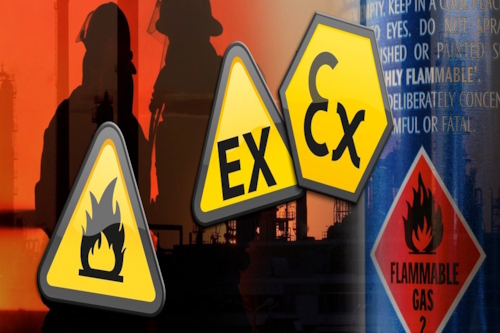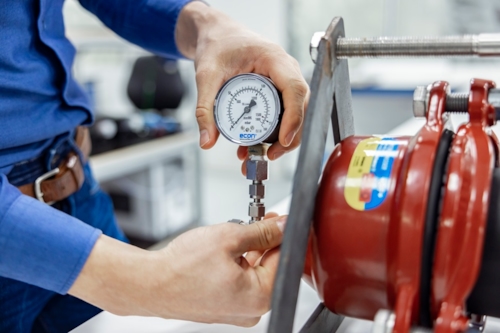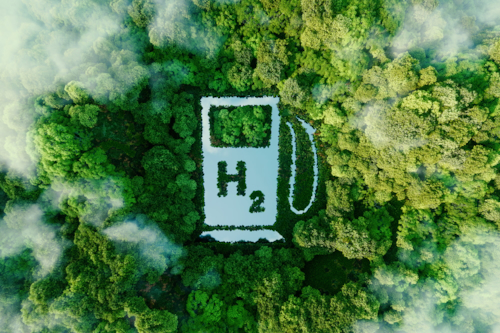
Hydrogen Systems Compliance and Safety
Receive a quote tailored to your needs
Some of the services part of this solution
Hydrogen applications require strict adherence to material compatibility and safety standards. Our services provide in-depth testing, certification, and compliance assessments for hydrogen infrastructure, industrial and mobility applications to ensure safety, durability, and regulatory compliance.
Certification, Testing
Hydrogen components and systems testing and certification
One of the success factors to create a hydrogen economy is having safe and certified hydrogen components systems. Kiwa is one of the leading parties in this area. We can assist you, as a manufacturer in the hydrogen business, to get safe and certi...

Certification, Testing
Hydrogen generators testing and certification
One of the success factors in creating a hydrogen economy is having safe and certified hydrogen generators. Kiwa is one of the leading parties in this area: We assist you, as a manufacturer in the hydrogen marketplace, to achieve safe and certifie...

Inspection
99/92/EC (ATEX-137) - Directive on the explosion protection document and zoning file
Are you sure you have sufficiently reduced the risk of explosion? Do you have an explosion protection document and/or zoning file? Do you know which products and/or installations may present an explosion risk? Vinçotte (member of Kiwa Group) will check these points for you, and make sure you comply with the relevant legal provisions.

Certification, Inspection
Pressure Equipment Directive Quality (PED)
Pressure Equipment Directive Quality certification with Kiwa: prove the safety and conformity of your pressure equipment, be ready for ISO 9001 and be competitive in the European market.

Consultancy
Permeation and chemical compatibility
Kiwa is your partner for assessing the chemical compatibility and material performance of applied materials and the corresponding tests like permeation, immersion or rapid gas decompression tests. Testing material samples, pipes, components or even complete systems is possible.

Certification
ISO/TS 19880-1 for Hydrogen Fueling Stations
Hydrogen is slowly becoming the go-to transition low carbon fuel for transportation. To fuel the hydrogen engines, owners of petrol stations are either developing or investing in hydrogen fueling stations. To do this in a safe and harmonized way an international standard was developed: the ISO/TS 19880-1.

Why choose our Hydrogen Safety and Compliance solutions?
Ensuring hydrogen system safety is crucial for preventing failures, ensuring regulatory compliance, and fostering market confidence. Our comprehensive testing and certification services provide risk mitigation, material validation, and performance assessment for hydrogen production, storage, distribution, and utilization systems.
Ensure hydrogen system safety and integrity
Meet global hydrogen safety regulations
Verify material compatibility and durability
Enhance hydrogen fueling station safety
Support sustainable hydrogen adoption
Hydrogen system compliance process
Hydrogen safety and compliance require rigorous material testing, pressure evaluations, and adherence to international standards. Our structured process ensures that hydrogen components and infrastructure meet all safety, performance, and regulatory requirements for safe and efficient operations.
High-pressure system testing and certification
Material compatibility & risk assessment
High-pressure system testing and certification
Regulatory compliance verification and documentation
Final certification and ongoing safety monitoring
Ensuring safety in Hydrogen systems and infrastructure
Hydrogen -plays a crucial role in the energy transition, but safety and material compatibility challenges remain key challenges to be addressed. Rigorous testing and regulatory compliance are essential for ensuring the reliability of hydrogen systems, protecting infrastructure, and enabling widespread adoption.
The adoption of hydrogen as a clean energy vector presents both opportunities and challenges. While clean hydrogen offers a promising alternative to fossil fuels, its safe handling, storage, and transportation require compliance with strict international standards.
Material compatibility is a primary concern. Hydrogen embrittlement can compromise the integrity of storage tanks, pipelines, and fuel systems, making ISO 11114 material testing crucial. Ensuring materials resist hydrogen-related degradation is critical for safety and longevity.
Hydrogen storage and transportation also involve high-pressure systems that must comply with ISO 19880 and PED 2014/68/EU regulations. These standards define the safety, performance, and operational requirements for hydrogen fueling stations, compressed hydrogen storage systems, dispensers, and distribution infrastructure. Compliance with ASME BPVC guidelines ensures that pressure vessels used in hydrogen applications can withstand operational pressures and stresses without failure.
To enable safe hydrogen mobility solutions, adherence to EN 17124 for hydrogen fuel quality and ISO 14687 for vehicle application standards is required. These certifications ensure hydrogen purity and vehicle refueling compatibility, meeting global safety benchmarks and supporting the broader adoption of hydrogen-powered vehicles across various transportation sectors.
Continuous monitoring and safety assessments are crucial for maintaining compliance and preventing risks. Hydrogen systems require regular testing, safety inspections, and certification updates to align with the latest regulatory and technological advancements.
By implementing a comprehensive approach to hydrogen system safety, manufacturers and infrastructure developers can mitigate risks, enhance reliability, and accelerate the global transition to hydrogen-powered future. Our specialized services provide the expertise needed to test, certify, and validate hydrogen applications, ensuring a safe and efficient hydrogen future.
Ensure Hydrogen System safety with certified compliance
Get expert guidance and certification for your hydrogen systems. Whether you need material compatibility testing, high-pressure system verification, or fueling station compliance, we provide comprehensive services all in one place. Contact us today for a tailored quote.
Frequently Asked Questions
Find answers to common questions about hydrogen system compliance, material safety, and regulatory certification requirements.
Why is material compatibility crucial for hydrogen applications?
Hydrogen can cause material embrittlement, weakening structuresover time and leading to potential failures. ISO 11114 testing ensures material are safe for storage and transportation.
What certifications are needed for hydrogen fueling stations?
Hydrogen fueling stations require ISO 19880 certification, which covers safety, performance and operational standards for hydrogen refueling infrastructure, ensuring safe and efficient operation.
What are the risks of non-compliant hydrogen storage?
Non-compliant hydrogen storage can lead to leaks, pressure failures, or explosions. Compliance with standards or directives such as ISO 19880, PED 2014/68/EU, ATEX 2014/34/EU ensure safe, reliable storage systems.
How does ISO 14687 impact hydrogen fuel quality?
ISO 14687 sets purity standards for hydrogen fuel, ensuring it is clean and suitable in fuel cells and hydrogen-powered vehicles, optimizing performance and longevity.
What industries benefit from hydrogen compliance testing?
Industries like energy, transportation, aerospace, and manufacturing benefit from hydrogen compliance testing to ensure safety, performance, and efficiency, in hydrogen use.


